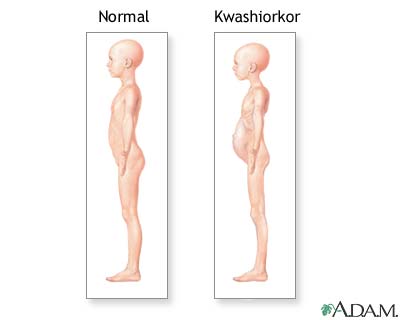Health Library
Kwashiorkor
Protein malnutrition; Protein-calorie malnutrition; Malignant malnutrition
Kwashiorkor is a form of malnutrition that occurs when there is not enough protein in the diet.
Images

I Would Like to Learn About:
Causes
Kwashiorkor is most common in areas where there is:
- Famine
- Limited food supply
- Low levels of education (when people do not understand how to eat a proper diet)
This disease is more common in very poor countries. It may occur during:
- Drought or other natural disaster
- Political unrest
These events often lead to a lack of food, causing malnutrition.
Kwashiorkor is rare in children in the United States. There are only isolated cases. However, one government estimate suggests that as many as half of old age people living in nursing homes in the United States do not get enough protein in their diet.
When kwashiorkor does occur in the United States, it is most often a sign of child abuse and severe neglect.
Symptoms
Symptoms include:
- Changes in skin pigment
- Decreased muscle mass
- Diarrhea
- Failure to gain weight and grow
- Fatigue
- Hair changes (change in color or texture)
- Increased and more severe infections due to damaged immune system
- Irritability
- Large belly that sticks out (protrudes)
- Lethargy or apathy
- Loss of muscle mass
- Rash (dermatitis)
- Shock (late stage)
- Swelling (edema)
Exams and Tests
The physical exam may show an enlarged liver (hepatomegaly) and general swelling.
Tests may include:
- Arterial blood gas
- BUN
- Complete blood count (CBC)
- Creatinine clearance
- Serum creatinine
- Serum potassium
- Total protein levels
- Urinalysis
Treatment
People who start early treatment can recover fully. The goal is to get more calories and protein into their diet. Children with the disease cannot reach their complete height and growth.
Calories are given first in the form of carbohydrates, simple sugars, and fats. Proteins are started after other sources of calories have already provided energy. Vitamin and mineral supplements will be given.
Food must be restarted slowly since the person has been without much food for a long period of time. Suddenly eating high-calorie foods can cause problems.
Many malnourished children will develop intolerance to milk sugar (lactose intolerance). They will need to be given supplements with the enzyme lactase so that they can tolerate milk products.
People who are in shock need treatment right away to restore blood volume and maintain blood pressure.
Outlook (Prognosis)
Getting treatment early generally leads to good results. Treating kwashiorkor in its late stages will improve the child's general health. However, the child may be left with permanent physical and mental problems. If treatment is not given or comes too late, this condition is life threatening.
Possible Complications
Complications may include:
When to Contact a Medical Professional
Call your health care provider if your child has symptoms of kwashiorkor.
Prevention
To prevent kwashiorkor, make sure your diet has enough carbohydrates, fat (at least 10% of total calories), and protein (12% of total calories).
Related Information
Protein in dietFatigue
Fussy or irritable child
Failure to thrive
Swelling
Immune response
Atopic dermatitis
Vitiligo
Shock
Decreased alertness
References
Ashworth A. Nutrition, food security, and health. In: Kliegman RM, St. Geme JW, Blum NJ, Shah SS, Tasker RC, Wilson KM, eds. Nelson Textbook of Pediatrics. 21st ed. Philadelphia, PA: Elsevier; 2020:chap 57.
Manary MJ, Trehan I. Protein-energy malnutrition. In: Goldman L, Schafer AI, eds. Goldman-Cecil Medicine. 26th ed. Philadelphia, PA: Elsevier; 2020:chap 203.
BACK TO TOPReview Date: 2/24/2022
Reviewed By: Neil K. Kaneshiro, MD, MHA, Clinical Professor of Pediatrics, University of Washington School of Medicine, Seattle, WA. Also reviewed by David Zieve, MD, MHA, Medical Director, Brenda Conaway, Editorial Director, and the A.D.A.M. Editorial team.
 | A.D.A.M., Inc. is accredited by URAC, for Health Content Provider (www.urac.org). URAC's accreditation program is an independent audit to verify that A.D.A.M. follows rigorous standards of quality and accountability. A.D.A.M. is among the first to achieve this important distinction for online health information and services. Learn more about A.D.A.M.'s editorial policy, editorial process and privacy policy. A.D.A.M. is also a founding member of Hi-Ethics. This site complies with the HONcode standard for trustworthy health information: verify here. |
The information provided herein should not be used during any medical emergency or for the diagnosis or treatment of any medical condition. A licensed medical professional should be consulted for diagnosis and treatment of any and all medical conditions. Links to other sites are provided for information only -- they do not constitute endorsements of those other sites. © 1997- 2022 A.D.A.M., a business unit of Ebix, Inc. Any duplication or distribution of the information contained herein is strictly prohibited.
